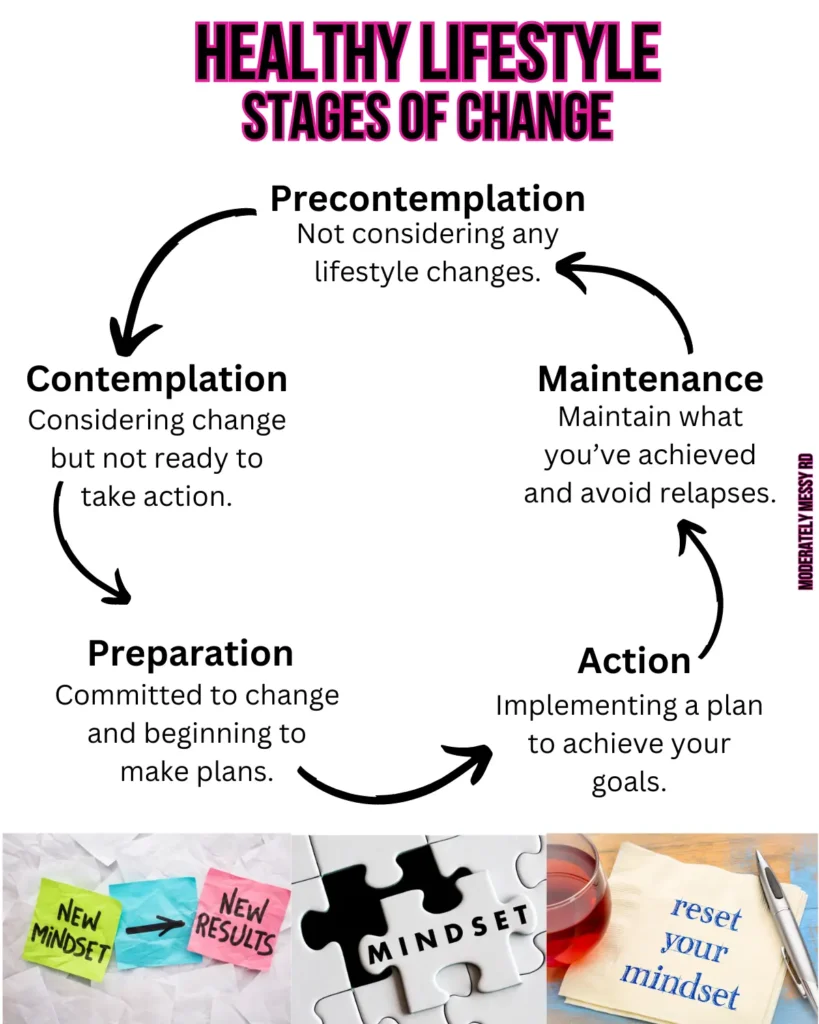Achieving and maintaining a healthy lifestyle is not just about hitting the gym or counting calories. It involves a significant mindset shift which prepares you to overcome resistance and ambivalence. In this post, we’ll explore the key stages of making behavior changes for a healthier lifestyle with tips on how to achieve a healthy lifestyle or weight management mindset!

In regards to health promotion, people are more likely to change their behavior in response to motivation rather than an influx of information. You might have all the resources to implement healthier habits but if you don’t have that drive to do so – what is the point? How do you get there?
Many people tend to attribute their challenges to various life circumstances, but the truth is that much of it boils down to mindset. While external factors can certainly play a role, it’s often our thoughts and attitudes that determine how we navigate and respond to those challenges.
For example, I work with patients who have chronic kidney disease. I’ve noticed that once they get that diagnosis it’s like “okay, there are no more excuses – I have to make changes because I don’t want to be on dialysis”.
Sometimes, it’s just figuring out how to evaluate uncertainty and resistance while boosting self-confidence! The journey is not a straight line – what matters most is embracing the process and keep moving forward!
Different Stages of Change

Let’s go over the different stages of change which might help if you don’t have the money or the time to see a dietitian one-on-one. If you were to see a dietitian, they may take a motivational interviewing approach based on the transtheoretical theory.
According to the theory, modifying human behavior is a process involving 5 different stages of change: precontemplation, contemplation, preparation, action, and maintenance.
Precontemplation
In the precontemplation stage, you might not even be considering a healthier lifestyle. You might be unaware of the need for change or feel like there are too many challenges standing in your way to make those changes. This stage usually comes with denial and resistance.
Tips for the Precontemplation Stage:
Contemplation
In the contemplation stage, an individual is considering making a change but are not quite ready to take action. Many will weigh the pros and cons of weight loss or eating healthier which results in ambivalence. Part of you might want to make changes, while the other part of you does not.
An example would be wanting to lose weight, but feeling like there isn’t enough time in the day to workout. Motivation for change typically happens when you recognize there is a discrepancy between your current lifestyle and a personal goal. It’s like a fork in the road.
Tips When Experiencing Ambivalence in the Contemplation Stage:
Preparation
In the preparation stage, you’ve committed to making steps to living a healthier life! You begin to make concrete plans and come up with strategies to achieve specific goals. That could be joining a gym, starting to meal prep, or eating more fruits and vegetables.
What to Focus on in the Preparation Stage:
Action
The action stage is where you start implementing your plans to achieve your goals. It is often considered the most challenging stage as it involves behavioral changes and the development of new habits. Consistency and a positive mindset is key!

How to Persevere During the Action Stage:
Maintenance
So, you’ve achieved some of your goals – now you have to maintain what you’ve achieved and avoid relapses. This stage is all about continuing the healthy habits you’ve created.
Tips for the Maintenance Stage:
For More Resources:
— Weight Loss Plateaus: Why It Happens and How to Stop It
— How to Lose Weight As a Busy Mom: 10 Strategies for Long-Term Success
— 10 Tips for Weight Management During the Holidays
It’s Complex
Behavior change is a very complex topic – that’s why so many individuals don’t do it until they absolutely need to. A healthy lifestyle mindset is a tool you can explore. The journey to a healthier lifestyle starts with you and you only.
You have to figure out how to cultivate the right mindset. If you struggle to do that, consulting a dietitian may just be the right step for you.
I hope this post gave you some inspiration or motivation to achieve whatever goal you’ve had your mind set on. It’s going to be different for everyone! What works for you might not work for someone else, and vice versa.
